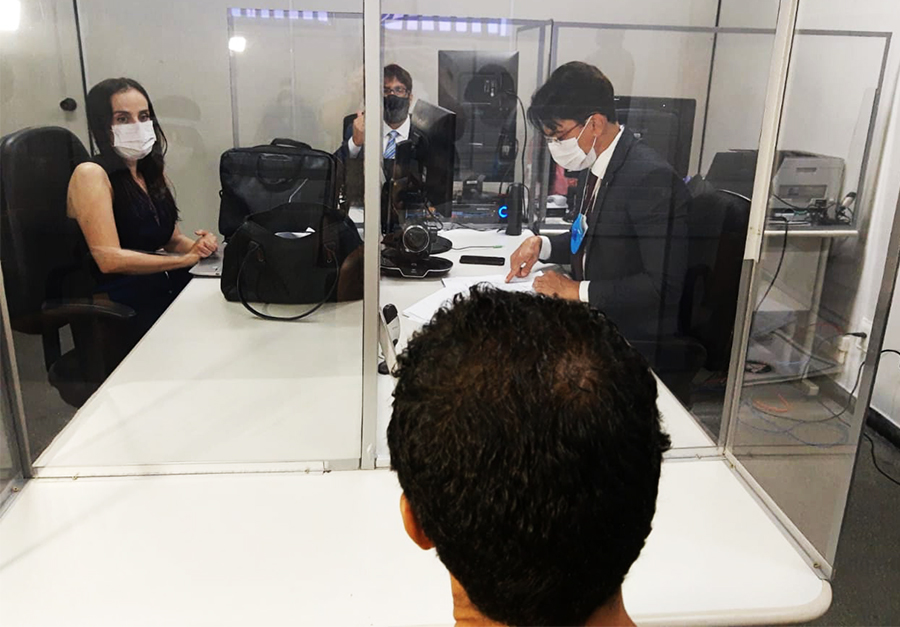Justice by video conference suppresses complaints of torture, organizations tell IACHR
Anti-torture organizations call on international body to oppose the use of virtual procedures in criminal justice
 Audiência de custódia presencial durante a pandemia. Foto: TJSE
Audiência de custódia presencial durante a pandemia. Foto: TJSE
The use of videoconferencing in pre-trial custody hearings undermines the fight against torture. This is the claim made by human rights organizations that participated on Wednesday, June 30, in a hearing staged by the Inter-American Commission on Human Rights (IACHR) to debate the matter, in particular the effects of so-called virtual justice on the right to a legal defense and on the physical integrity of persons deprived of liberty in the region.
According to the organizations that signed a document with complaints submitted to the IACHR, the suspension of in-person custody hearings – one of the primary ways of curbing police abuse – is currently one of the main obstacles in the combat of torture in Brazil and Latin America.
Before the pandemic, the law established that detainees must be presented before a judge as soon as possible after their arrest to assess the legality of the detention and to look for any signs of mistreatment – which is impossible remotely, on a computer screen, without being able to see the body of the detainee. In Brazil, three months after the pandemic was declared by the WHO, reports of torture fell 83%, according to data from the National Justice Council (CNJ).
Read more
Research commissioned by the Association for the Prevention of Torture (APT), which looked at 16 countries over a period of 30 years, showed that presenting detainees before a judge within hours of their arrest is the most effective way to prevent and reduce torture and mistreatment precisely at the time when the risk of abuse and torture is highest.
“The screen, the physical absence of the defense and the fact that virtual hearings often occur inside the police station or the prison system rules out any sense of security that the detainee needs to report any violence they may have suffered,” said Sylvia Dias, a lawyer and representative of APT in Brazil.
According to the advisor for the program to Combat Institutional Violence at Conectas, Carolina Diniz, remote justice reduces the chance of complaints being reported. “Without a safe environment, reports of violence are unlikely to even come to light, undermining the accountability and the oversight of police activity,” she said.
The organizations also warned of the risk that remote legal procedures may be converted from an exception during the pandemic to the rule. A survey conducted by the Defense of the Right to a Defense Institute (IDDD) found that, from March to November last year, 19 State Courts in the country permitted custody hearings to be held virtually, and 12 of them did not establish a time frame to return to normal.
“The minute the Senate approved the ban on the use of video conferences, a legislative bill materialized to regulate them. The greatest danger is that the remote hearings continue after the health emergency, as if this wasn’t one of the biggest setbacks to combating torture and the obstacles in the way of a full legal defense,” said the criminal lawyer Hugo Leonardo, president of IDDD.
In the state of Pernambuco, custody hearings started being held by video conference in late January 2021, in the local police stations. According to Maria Clara D’Ávila, a lawyer for the Office of Legal Counsel to Grassroots Organizations (GAJOP), “for example, the lack of the physical presence of the Public Defender’s Office in the police stations further undermines the access to a defense at this time”.
Custody hearings, which are not public in the virtual format, were permitted by video conference by CNJ Resolution 357/2020. There are currently at least two bills pending in the Brazilian Congress to permit remote hearings definitively. The virtual format has also undermined the publicity of this type of hearing in countries such as Bolivia and Ecuador.
“Before implementing, expanding and normalizing remote hearings, States should carefully analyze the problems they already face in access to justice,” said Isabel Roby, of the Latin American office of Fair Trials, an organization that also participated in the hearing at the IACHR.
The organizations drew attention to the fact that the impacts of conducting criminal justice remotely are still unknown. There are, for example, no studies on the effect that remote justice has on the perception of judges, or on whether the appearance of detainees in a prison setting affects the presumption of innocence. And the communication problems that already existed in the in-person sessions are likely worse. According to a survey conducted in 2019 by IDDD, in São Paulo three quarters of the detainees leave the hearing without even understanding what happened.
In addition to a report on the normalization and expansion of virtual justice in these different settings, the organizations are calling on the IACHR to set international standards, particularly with regard to the use of video conferencing in custody hearings. The Supreme Court justices will have until the first day of July to publish their votes.






